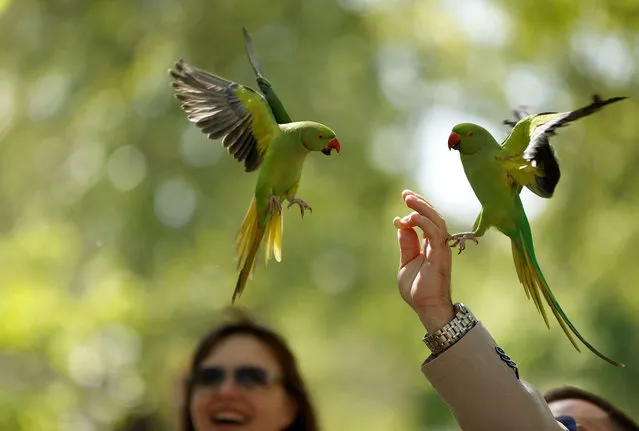
A man feeds parakeets in St James Park as the spread of the coronavirus disease (COVID-19) continues, London, Britain, April 22, 2020. (Photo by John Sibley/Reuters)
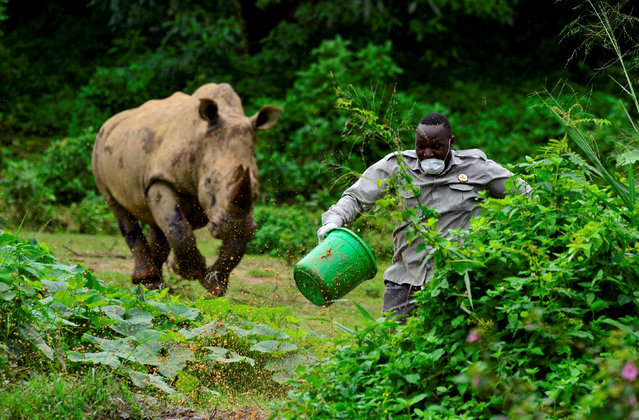
Steven Busulwa, an animal keeper, runs away from a charging rhino at the Uganda Wildlife Conservation Education Center (UWEC) amid the lockdown as part of the measures taken to prevent the spread of the coronavirus disease (COVID-19), within Wakiso district, in Entebbe, Uganda on April 20, 2020. (Photo by Abubaker Lubowa/Reuters)
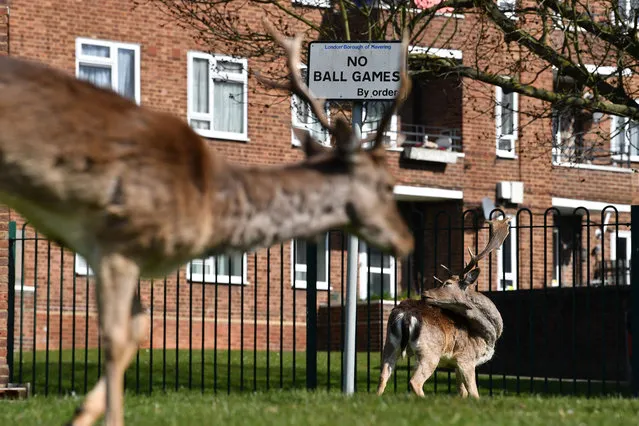
A herd of fallow deer graze on the lawns in front of a housing estate in Harold Hill in east London on April 4, 2020, as nature takes advantage of life in Britain during the nationwide lockdown to combat the novel coronavirus pandemic. (Photo by Ben Stansall/AFP Photo)
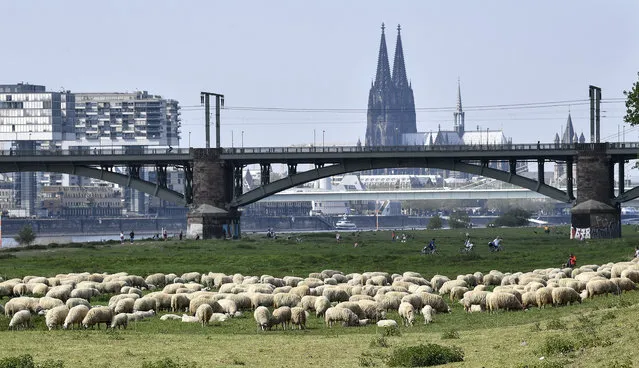
A flock of sheep graze at the river Rhine near the Cathedral in Cologne, Germany, Monday, April 27, 2020. (Photo by Martin Meissner/AP Photo)
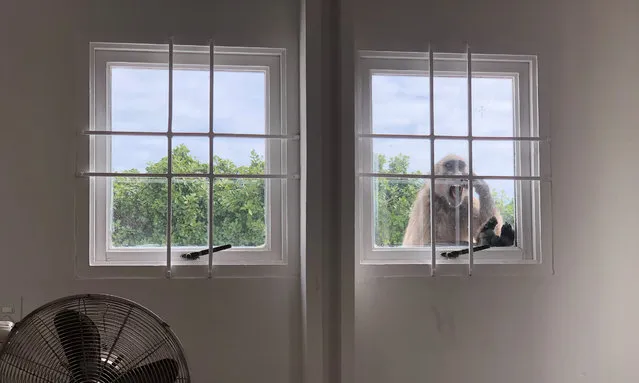
A female chacma baboon pays a visit to a house in Cape Town, South Africa. This picture is one of the photographs of wildlife through the window by Guardian readers during lockdown, in April 2020. (Photo byKarien van der Westhuizen/Guardian Community)
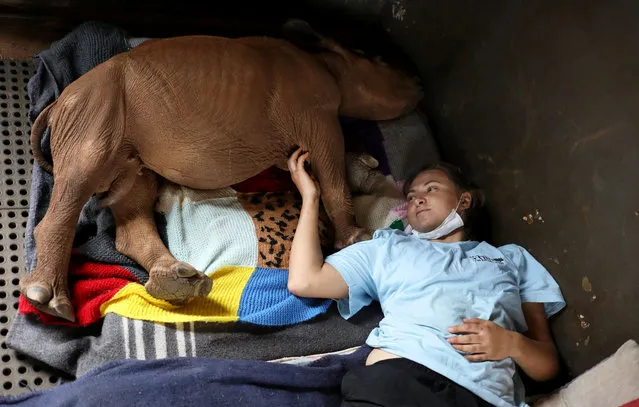
Larize Nel, a volunteer lies next to Mapimpi, an orphaned rhino, amid the spread of the coronavirus disease (COVID-19) at a sanctuary for rhinos orphaned by poaching, in Mookgopong, Limpopo province, South Africa on April 17, 2020. (Photo by Siphiwe Sibeko/Reuters)
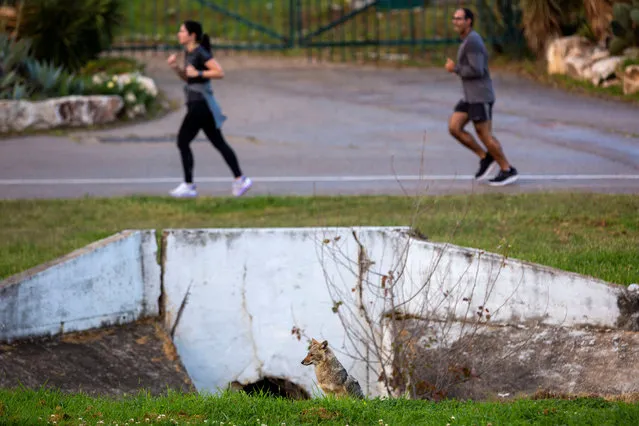
In this Friday, April 10, 2020 photo, people jog near a jackal at Hayarkon Park in Tel Aviv, Israel. With Tel Aviv in lockdown due to the coronavirus crisis, and the park, like most of the city, is nearly empty, the timid animals have come into the open, reaching areas where they rarely venture as they search for food. (AP Photo/Oded Balilty)
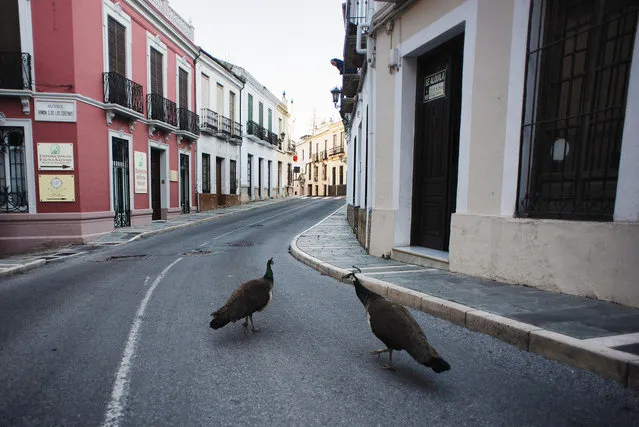
Two peacocks walk down a street in Ronda on April 3, 2020 during a national lockdown to prevent the spread of the COVID-19 coronavirus. More than 900 people died in Spain over the past 24 hours for the second day running, government figures showed, although the rate of new infections and deaths continued to slow. (Photo by Jorge Guerrero/AFP Photo)
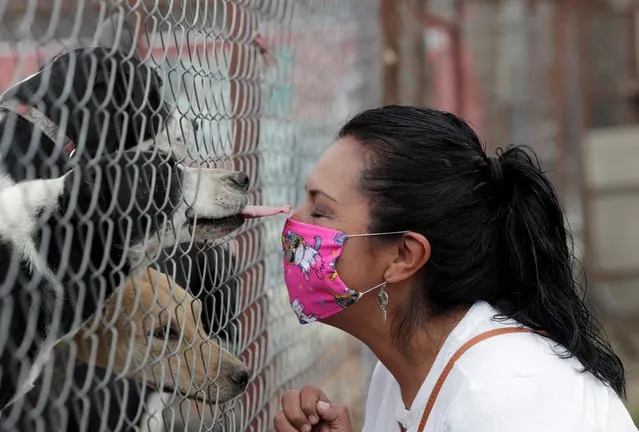
Pet adopter Mary Carmen Arreguin, 41, gestures to dogs behind a fence at San Gregorio animal shelter which is promoting pet adoptions as a way of making quarantine more bearable, while the spread of the coronavirus disease (COVID-19) continues, in El Ajusco, on the southern outskirts of Mexico City, Mexico on April 24, 2020. (Photo by Henry Romero/Reuters)
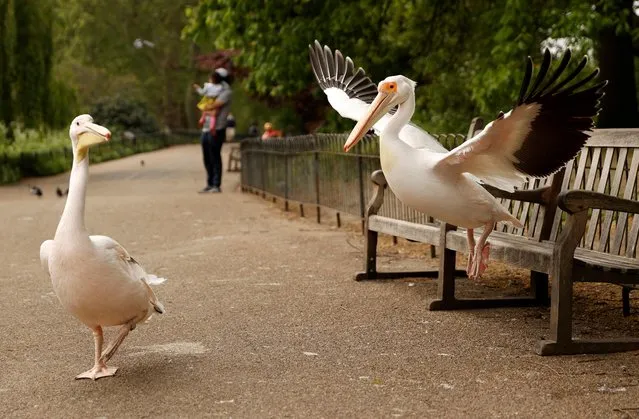
Pelicans are seen in St James' Park, following the outbreak of the coronavirus disease (COVID-19), London, Britain, April 27, 2020. (Photo by John Sibley/Reuters)
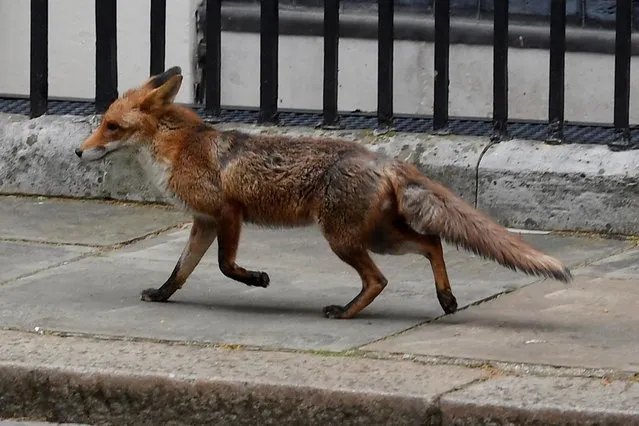
A fox is seen in Downing Street, following the outbreak of the coronavirus disease (COVID-19), London, Britain, April 29, 2020. (Photo by Toby Melville/Reuters)
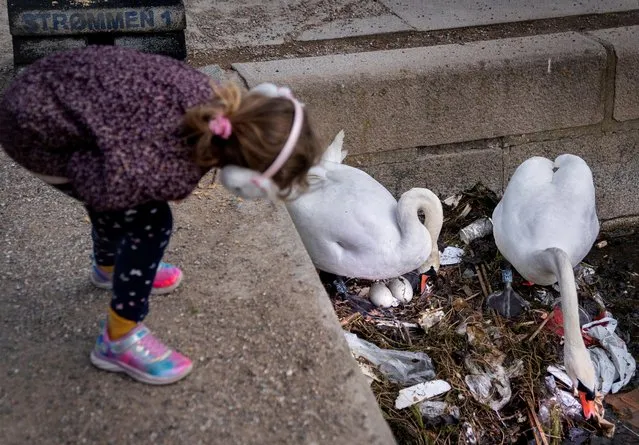
A swan couple is building a nest of waste and garbage at the Lakes in central Copenhagen, Denmark, on April 28, 2020. (Photo by Liselotte Sabroe/Ritzau Scanpix/AFP Photo)
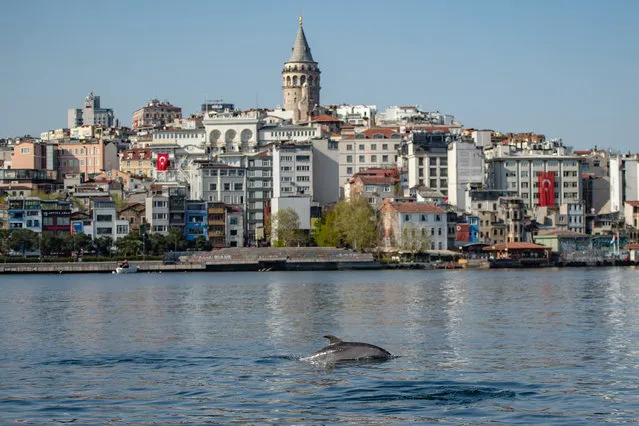
A dolphin swims in the Bosphorus by Galata tower, where sea traffic has nearly come to a halt on April 26, 2020, as the city of 16 million has been under lockdown since April 23rd as part of government measures to stem the spread of the Covid-19 pandemic caused by the novel coronavirus. In the waters of the Bosphorus, dolphins are these days swimming near the shoreline in Turkey's largest city Istanbul with lower local maritime traffic and a ban on fishing. (Photo by Yasin Akgul/AFP Photo)
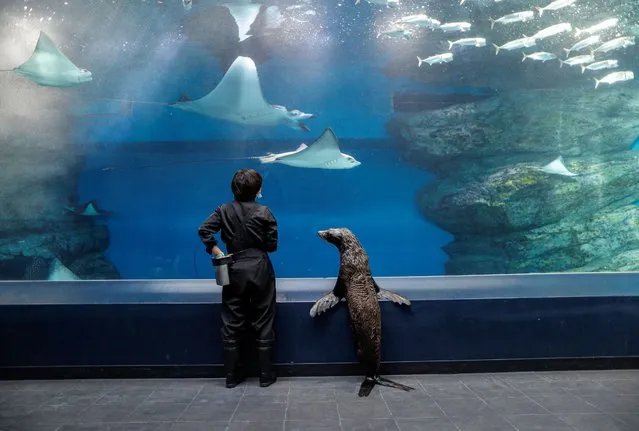
A female seal Shakitto and the aquarium keeper Manami Suka stroll together as a part of their practice for their show at an empty visitors' area at the Aqua Park Shinagawa which is closed to the public amid the coronavirus disease (COVID-19) outbreak in Tokyo, Japan on April 30, 2020. (Photo by Issei Kato/Reuters)
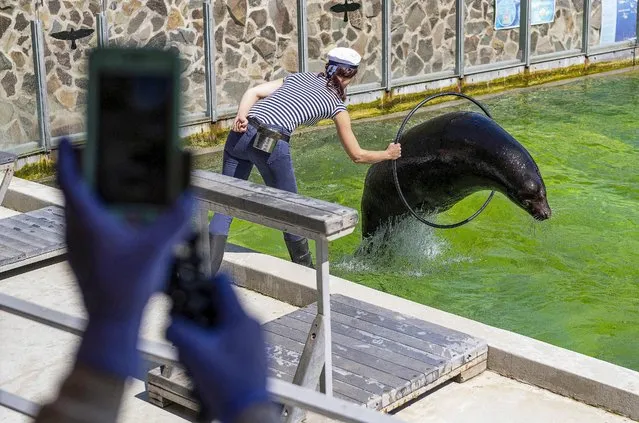
A California sea lion (Zalophus californianus) performs during an online show at the Nyiregyhaza Animal Park in Nyiregyhaza, Hungary, 24 April 2020, amid the ongoing coronavirus COVID-19 pandemic. The closed zoo offered the show for virtual visitors due to the lockdown to prevent the spread of the SARS-CoV-2 coronavirus which causes the COVID-19 disease. (Photo by Attila Balazs/EPA/EFE/Rex Features/Shutterstock)
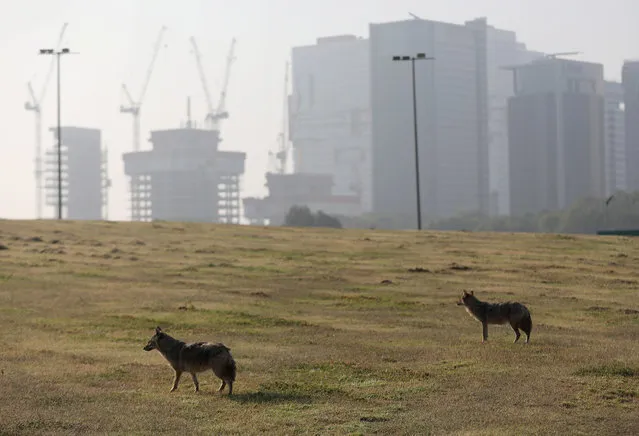
Jackals roam at Hayarkon Park in Tel Aviv, Israel, 15 April 2020. Reports state that wild animals feel safer walking around the streets of the cities and empty parks as most citizens are staying back home due to Israeli police tightly enforce a general lockdown during the Passover Holiday in order to prevent the spread of the SARS-CoV-2 coronavirus which causes the Covid-19 disease. (Photo by Abir Sultan/EPA/EFE)
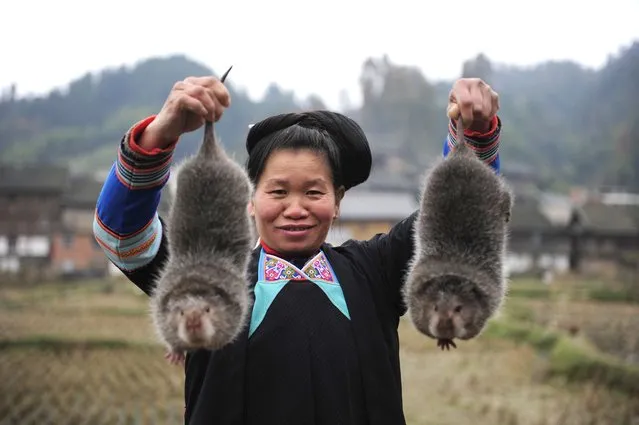
A woman with bamboo rats in Congjiang County, Guizhou Province, China on December 18, 2012. Peasants in Congjiang County, southwest China's Guizhou Province, have taking to “farming” bamboo rats in an effort to increase their annual incomes. Shi Beidan, a local rat farmer, raise 2,000 bamboo rats, which can be sold for meat and fur. Bamboo rats are a species of rodent that are found in the eastern half of Asia. (Photo by Hap/Quirky China News/Rex Features/Shutterstock)
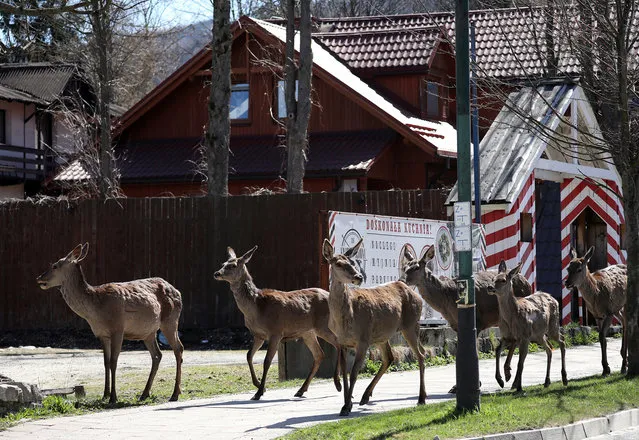
Five does (female roe deer) and a young fawn with a missing patch of fur roam on a nearly-empty sidewalk in Zakopane, southern Poland, 16 April 2020. The European roe deer (Capreolus capreolus) is endemic to the Tatra Mountains that straddle the border between Poland and Slovakia. The ongoing pandemic of the COVID-19 disease caused by the SARS-CoV-2 coronavirus has sparked stay-at-home rules worldwide, which in turn have resulted in empty urban agglomerations that are slowly being reclaimed by certain wild species. Animals freely roaming around towns and cities they had previously avoided are becoming an increasingly common sight around the planet. (Photo by Grzegorz Momot/EPA/EFE)
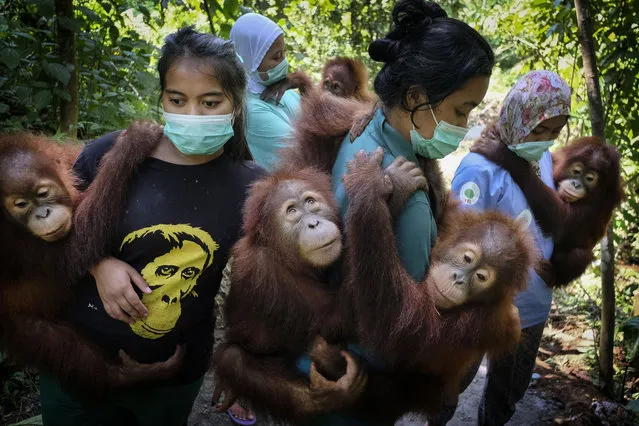
Substitution mothers are on the way to the forest school with orphaned orangutans where they will teach them to climb trees in Sibolangit, SOCP Quarantine Centre, North Sumatra, Indonesia on January 22, 2019. Like humans, the mother orangutan has to teach her kids everything they need to know to survive on their own. At the SOCP center, human caregivers take on that maternal role. It is the first step in a teaching, socialization and rehabilitation program with the goal of release at the age of 7 to 8 years old. This corresponds with the age when orangutans naturally leave their parents in the wild. (Photo by Alain Schroeder/National Geographic)
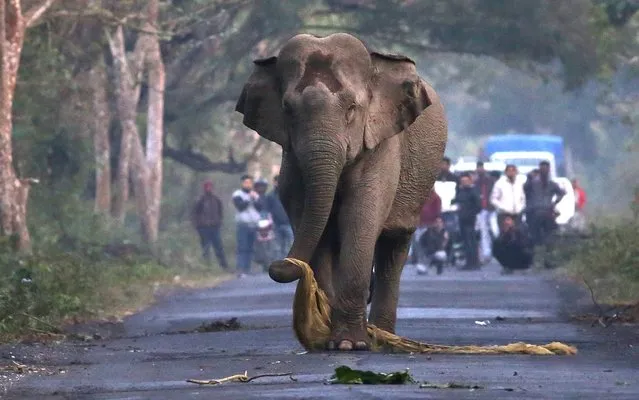
An angry female elephant “loses its rag” as it crosses a road. The animal picks up a piece of old cloth with its trunk and throws it on the ground in frustration after drunken locals got in its way. The unusual pictures were taken in Buxa Tiger Reserve, in Alipurduar district, in West Bengal, India on April 2020. (Photo by Souvik Basu/Solent News)
08 May 2020 00:05:00,
post received
0 comments
